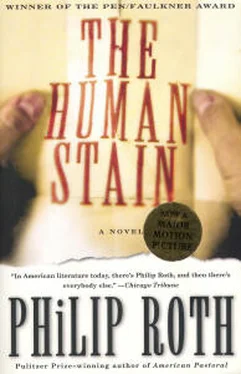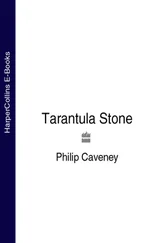Her point was that Coleman was not one of those ex-GIs fighting for integration and equality and civil rights; in Walt's opinion, he was never fighting for anything other than himself. Silky Silk. That's who he fought as, who he fought for, and that's why Walt could never stand Coleman, even when Coleman was a boy. In it for himself, Walt used to say. In it always for Coleman alone. All he ever wanted was out.
We had finished lunch at my house several hours earlier, but Ernestine's energy showed no signs of abating. Everything whirling inside her brain — and not just as a consequence of Coleman's death but everything about the mystery of him that she had been trying to fathom for the last fifty years — was causing her to speak in a rush that was not necessarily characteristic of the serious smalltown schoolteacher she'd been for the whole of her life. She was a very proper-looking woman, seemingly healthy if a bit drawn in the face, whose appetites you couldn't have imagined to be in any way excessive; from her dress and her posture, from the meticulous way she ate her lunch, even from the way she occupied her chair, it was clear that hers was a personality that had no difficulty subjugating itself to social convention and that her inmost reflex in any conflict would be to act automatically as the mediator — entirely the master of the sensible response, by choice more of a listener than a maker of speeches, and yet the aura of excitement surrounding the death of her self-declared white brother, the special significance of the end of a life that to her family had seemed like one long, perverse, willfully arrogant defection, could hardly be reckoned with by ordinary means.
“Mother went to her grave wondering why Coleman did it. ‘Lost himself to his own people.’ That's how she put it. He wasn't the first in Mother's family. There'd been others. But they were others. They weren't Coleman. Coleman never in his life chafed under being a Negro. Not for as long as we knew him. This is true. Being a Negro was just never an issue with him. You'd see Mother sitting in her chair at night, sitting there stock-still, and you knew what she was wondering: could it be this, could it be that? Was it to get away from Daddy? But by the time he did it, Daddy was dead. Mother would propose reasons, but none was ever adequate. Was it because he thought white people were better than us? They had more money than we did, sure — but better? Is that what he believed? We never saw the slightest evidence of that. Now, people grow up and go away and have nothing to do with their families ever again, and they don't have to be colored to act like that. It happens every day all over the world. They hate everything so much they just disappear. But Coleman as a kid was not a hater. The breeziest, most optimistic child you ever wanted to see. Growing up, I was more unhappy than Coleman. Walt was more unhappy than Coleman. What with all the success he had, with the attention people gave him ... no, it just never made sense to Mother. The pining never stopped. His photos. His report cards. His track medals. His yearbook. The certificate he got as valedictorian. There were even toys of Coleman's around, toys he'd loved as a small child, and she had all these things and she stared at them the way a mind reader stares into a crystal ball, as if they would unravel everything. Did he ever acknowledge to anyone what he'd done? Did he, Mr. Zuckerman? Did he ever acknowledge it to his wife? To his children?”
“I don't think so,” I said. “I'm sure he didn't.”
“So he was Coleman all the way. Set out to do it and did it. That was the extraordinary thing about him from the time he was a boy — that he stuck to a plan completely. There was a dogged commitment he could make to his every decision. All the lying that was necessitated by the big lie, to his family, to his colleagues, and he stuck to it right to the end. Even to be buried as a Jew. Oh, Coleman,” she said sadly, “ so determined. Mr. Determined,” and in that moment, she was closer to laughter than to tears.
Buried as a Jew, I thought, and, if I was speculating correctLy, killed as a Jew. Another of the problems of impersonation.
“If he acknowledged it to anyone,” I said, “maybe it was to the woman he died with. To Faunia Farley.”
She clearly didn't want to hear about that woman. But because of her sensibleness, she had to ask, “How do you know that?”
“I don't. I don't know anything. It's a thought I have,” I said. “It ties into the pact that I sensed was between them — his telling her.” By “the pact between them” I meant their mutual recognition that there was no clean way out, but I didn't go on to explain myself, not to Ernestine. “Look, learning this from you today, there's nothing about Coleman I don't have to rethink. I don't know what to think about anything.”
“Well then, you're now an honorary member of the Silk family. Aside from Walter, in matters pertaining to Coleman none of us has ever known what to think. Why he did it, why he stuck to it, why Mother had to die the way she did. If Walt hadn't laid down the law,” she said, “who knows what would have evolved? Who knows if Coleman wouldn't have told his wife as the years passed and he got further from the decision? Maybe even told his children one day. Maybe have told the world. But Walt froze everything in time. And that is never a good idea. Coleman did this when he was still in his twenties. A firecracker of twenty-seven. But he wasn't going to be twenty-seven forever. It wasn't going to be 1953 forever. People age. Nations age. Problems age. Sometimes they age right out of existence. Yet Walt froze it. Of course, if you look at it narrowly, from the point of view simply of social advantage, of course it was advantageous in the well-spoken Negro middle class to do it Coleman's way, as it's advantageous today not to dream of doing it that way. Today, if you're a middle-class intelligent Negro and you want your kids to go to the best schools, and on full scholarship if you need it, you wouldn't dream of saying that you're not colored. That would be the last thing you'd do. White as your skin might be, now it's advantageous not to do it, just as then it was advantageous to do it. So what is the difference? But can I tell that to Walter? Can I say to him, ‘So what really is the difference?’ First because of what Coleman did to Mother, and second because in Walter's eyes there was a fight to fight then, and Coleman didn't want to fight it — for those reasons alone, I most certainly cannot. Though don't think that over the years I haven't tried. Because Walter, in fact, is not a harsh man. You want to hear about my brother Walter? In 1944 Walter was a twenty-one-year-old rifleman with a colored infantry company. He was with another soldier from his outfit. They were on a ridge in Belgium overlooking a valley that was cut through by railroad tracks. They saw a German soldier walking east along the tracks. He had a small bag slung over his shoulder and he was whistling. The other soldier with Walter took aim. ‘What the hell are you doing?’ Walter said to him. ‘I'm going to kill him.’ ‘ Why? Stop! What's he doing? He's walking. He's probably walking home.’ Walter had to wrestle the rifle away from this fellow. A kid from South Carolina. They went down the ridge and they stopped the German and they took him prisoner. Turned out he was walking home. He had a leave, and the only way he knew to get back to Germany was to follow the railroad tracks east. And it was Walter who saved his life. How many soldiers ever did that? My brother Walter is a determined man who can be hard if he has to be, but he is also a human being. It's because he's a human being that he believes that what you do, you do to advance the race. And so I have tried with him, tried sometimes by saying things to Walter that I only half believe myself. Coleman was a part of his time, I tell him. Coleman couldn't wait to go through civil rights to get to his human rights, and so he skipped a step. ‘See him historically,’ I say to Walt. 'You're a history teacher — see him as a part of something larger.' I've told him, ‘Neither of you just submitted to what you were given. Both of you are fighters and both of you fought. You did battle your way and Coleman did battle his.’ But that is a line of reasoning that has never worked with Walter. Nothing has ever worked. That was Coleman's way of becoming a man, I tell him — but he will not buy that. To Walt, that was Coleman's way of not becoming a man. ‘Sure,’ he says to me, ‘sure. Your brother is more or less as he would have been, except he would have been black. Except? Except? That except would have changed everything.’ Walt cannot see Coleman other than the way he always has. And what can I do about that, Mr. Zuckerman? Hate my brother Walt for what he did to Coleman by freezing our family in time like that? Hate my brother Coleman for what he did to Mother, for how he made the poor woman suffer down to the very last day of her life? Because if I'm going to hate my two brothers, why stop there? Why not hate my father for all the things that he did wrong? Why not hate my late husband? I was not married to a saint, I can assure you. I loved my husband, but I have clear vision. And what about my son? There's a boy it would not be at all hard to hate. He goes out of his way to make it easy for you. But the danger with hatred is, once you start in on it, you get a hundred times more than you bargained for. Once you start, you can't stop. I don't know anything harder to control than hating. Easier to kick drinking than to master hate. And that is saying something.”
Читать дальше












